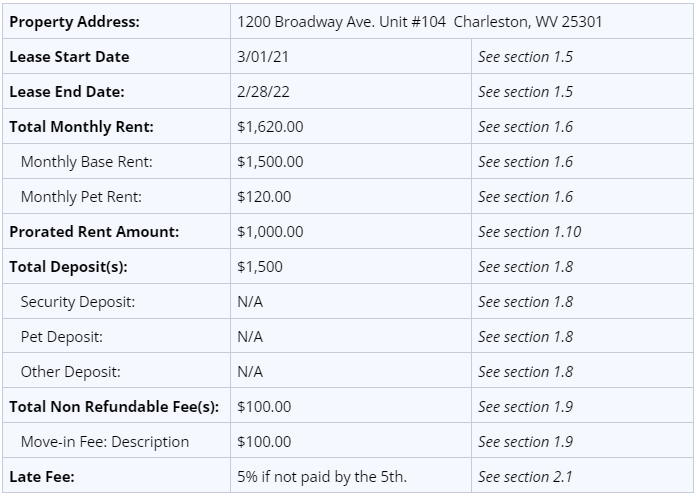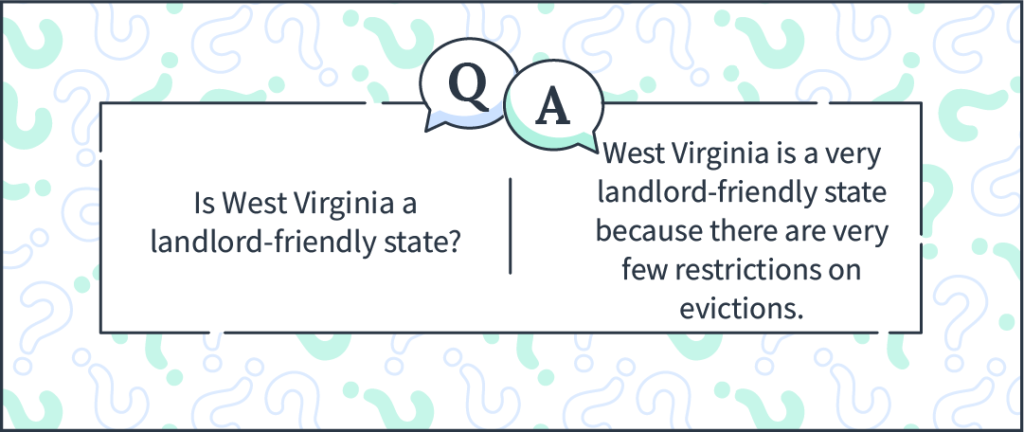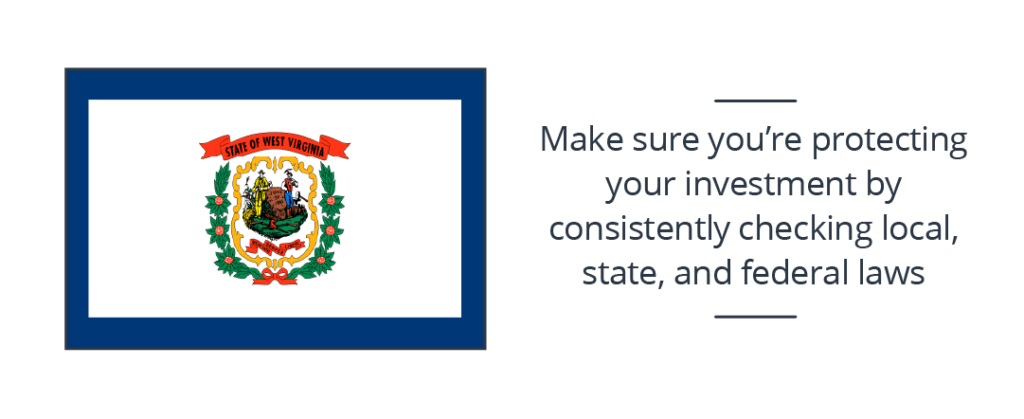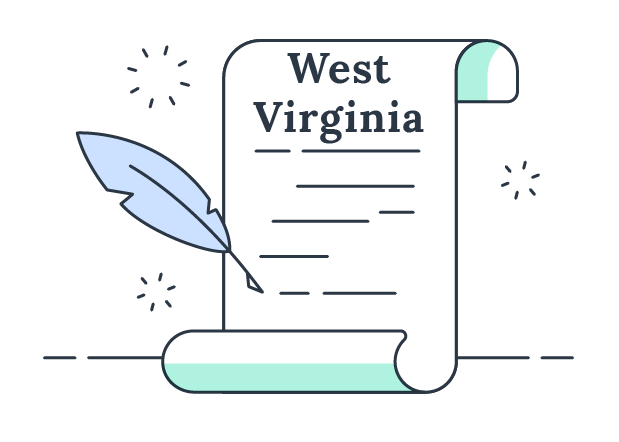With home values less than the national average and a booming economy, West Virginia is a great option for property investors. The state also boasts a competitive cost of living and endless outdoor recreation for anyone looking to relocate to this state.
Laws that impact the rental market, landlords, and tenants are constantly being decided in states. Make sure you know what’s on your ballot – find West Virginia voting information.

West Virginia Renters’ Rights and Landlord Responsibilities
- Have 60 days to return security deposit
- No notice required before raising rent
- No notice required before entering the property
- Required to make repairs within a reasonable time frame
When it comes to West Virginia rental laws, there are a few specifics landlords need to know:
- Security Deposit – West Virginia does not limit the amount a landlord may charge for the security deposit. However, landlords must return the deposit within 60 days of the tenant moving out.
- Raising Rent – Landlords in West Virginia may increase the rent to any amount for any reason with no notice.
- Notice of Entry – West Virginia does not require notice from the landlord before entering.
- Repairs – It is the landlord’s responsibility to keep the rental in safe and healthy living conditions. Landlords must make repairs within a reasonable time frame after being notified by the tenant. However, tenants may not take alternate action if the landlord fails to make repairs.
- Overdue Rent – If a tenant fails to pay rent on time, the landlord isn’t required to give them a notice and they may file for eviction immediately.
- Terminating a Lease – If a tenant needs to terminate a year-to-year lease, they must give the landlord a three-month notice.
- Tenant Responsibilities – Tenants are required to keep the property clean and not disturb neighbors.
- Abandoned Property – If a tenant moves out and leaves personal property, the landlord must send the tenant a notice and store the property for 30 days. After this time period, if the ex-tenant has not claimed it, the landlord may sell it or throw it away.
Rental Application Fee
There are no additional rental application fee laws in West Virginia.
Criminal History Check
- HUD (Federal) laws do not classify criminal backgrounds as a protected class, but making a decision to rent based off a criminal background alone could lead to a discrimination charge as it impacts certain protected groups of people disproportionately.
- However, if the criminal background check revealed a crime for the manufacture and distribution of drugs, homicide and/or stalking, denying the application is allowed.
- Landlords should have a consistent and equal policy or procedure in place to follow regarding criminal background checks so as not to discriminate against one class of people over another.
- HUD states that a landlord cannot ask about arrest records, only convictions, as innocent people are commonly arrested though the situation may not have resulted in a conviction.
- Some municipalities may have written their own laws expanding onto what you can and cannot ask regarding criminal backgrounds during the tenant screening process.
Security Deposit
Landlords have the following time periods to return the deposit:
- 45 days after a new tenant moves in or
- 60 days after lease termination
Build a West Virginia lease agreement in less than 15 minutes.
West Virginia Landlord-Tenant Law FAQ
Below are answers to some of the most commonly-asked questions when it comes to landlord-tenant laws in West Virginia:
Can You Withhold Rent in West Virginia?
Renters are not able to withhold rent for any reason in West Virginia.
How Long Does it Take to Evict a Tenant in West Virginia?
Evicting a tenant in West Virginia can take anywhere from 1 to 3 months depending on the reason for eviction.
Is West Virginia a Landlord-Friendly State?
West Virginia is a very landlord-friendly state because of the lack of rent control laws and there are very few restrictions on evictions.
What is the Eviction Process in West Virginia?
There are two reasons a landlord may file for eviction in West Virginia. The two reasons include violation of the lease agreement and the end of the lease term. Depending on the violation, the landlord may either file for eviction immediately or give them a notice to quit.
If the tenant fails to cure or quit, then the landlord may file a complaint with the court, which costs $30 to $200 depending on the court. After the complaint is filed, it will be served to the tenant up to 10 days before the hearing.
The hearing will then be scheduled within 5 to 10 business days after the date the landlord requests.
If the court rules in favor of the landlord, then a writ of possession will be issued within a few hours to weeks. Once received, the tenant will need to move out within a few days.
How Much Notice Does a Landlord Have to Give a Tenant to Move Out in West Virginia?
Landlords are not required to give any notice before asking a tenant to vacate the property.
Due Diligence and West Virginia Rental Laws
TurboTenant has utilized many municipal sources, along with official state statutes, in order to compile this information to the best of our ability. However, local laws are always in flux, and landlords and tenants alike should do their due diligence and consult legal help when it’s needed. We hope the following list can serve as a valuable resource and allow you to succeed as a landlord or tenant in West Virginia. Be sure to take proper precautions when it comes to finding the top candidates for your unit by utilizing our online rental application and tenant screening services.
Disclaimer: TurboTenant, Inc does not provide legal advice. This material has been prepared for informational purposes only. All users are advised to check all applicable local, state, and federal laws, and consult legal counsel should questions arise.
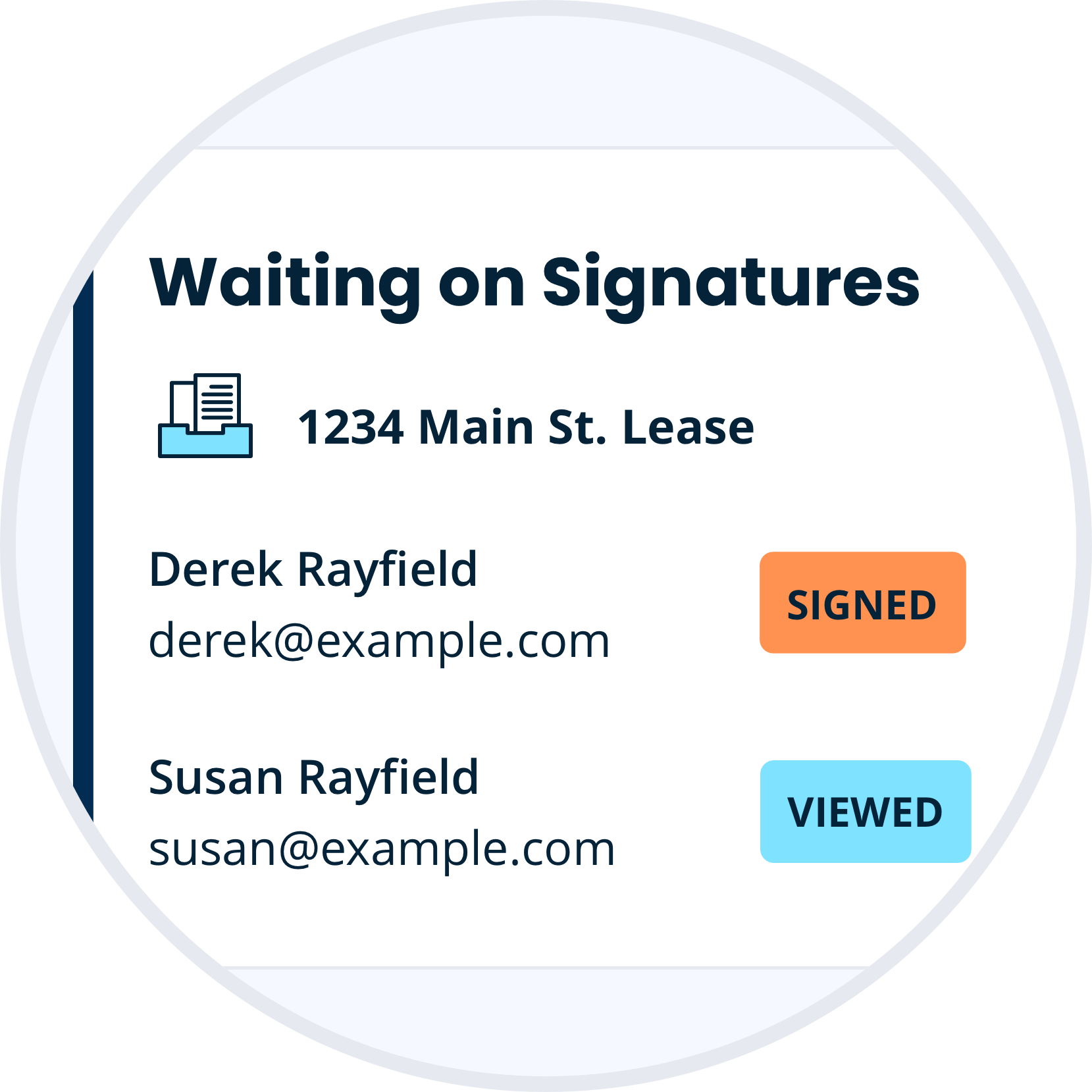
Unlimited Everything.
Create a single West Virginia lease agreement, or subscribe and receive unlimited lease agreements, landlord forms pack, and e-signs for a simple annual fee. Be confident with all the legal forms and tools you need as a professional landlord.
Discover Our Unlimited PlanWest Virginia Landlord-Tenant Law Resources
- Renters’ Rights Brochure – West Virginia Attorney General
- West Virginia Code Chapter 37 – Landlord-Tenant Relations
- Landlord-Tenant | Washington State – Contains general information that may be applicable
- West Virginia Legislature – Specifics on remedies for wrongful occupation.
- Justia – Section 55-3B-4 Petition for summary relief for wrongful occupation of residential rental property
- Legal Aid WV – Information about the Court Eviction Process for Renters in West Virginia
- Security Deposit Law
West Virginia Fair Housing Resources
Other State Resources
- Renters Rights – West Virginia Attorney General
- West Virginia Landlord and Tenant Duties
- Landlord-Tenant Responsibilities – City of Charleston
West Virginia Associations
- Northern Virginia’s Apartment Association
- West Virginia Association of REALTORS®
- Kanawha Valley Board of REALTORS® – Charleston
- Huntington Board of REALTORS®
- Morgantown Board or REALTORS®
- Parkersburg Area Association of REALTORS®
- Wheeling Board of REALTORS®
Federal Fair Housing Resources




